Business Communication: Overcoming Barriers to Communication
VerifiedAdded on 2023/06/11
|7
|1828
|181
Essay
AI Summary
This essay provides a comprehensive reflection on various aspects of business communication, drawing on personal insights and academic learning. It delves into the importance of effective communication, highlighting its role in successful information sharing and relationship building. The essay identifies and discusses various barriers to communication, such as physical, language, and cultural differences, and proposes strategies to overcome them. Furthermore, it emphasizes the significance of self-awareness in fostering effective communication and navigating cross-cultural interactions. The reflection also explores the ethical dimensions of decision-making in communication, emphasizing the alignment of actions and words with ethical principles. The author concludes by underscoring the interconnectedness of these themes and the potential for personal growth through enhanced communication skills, with a commitment to developing self-awareness and addressing communication barriers in future interactions. Desklib offers a platform for students to access this and similar resources for academic support.
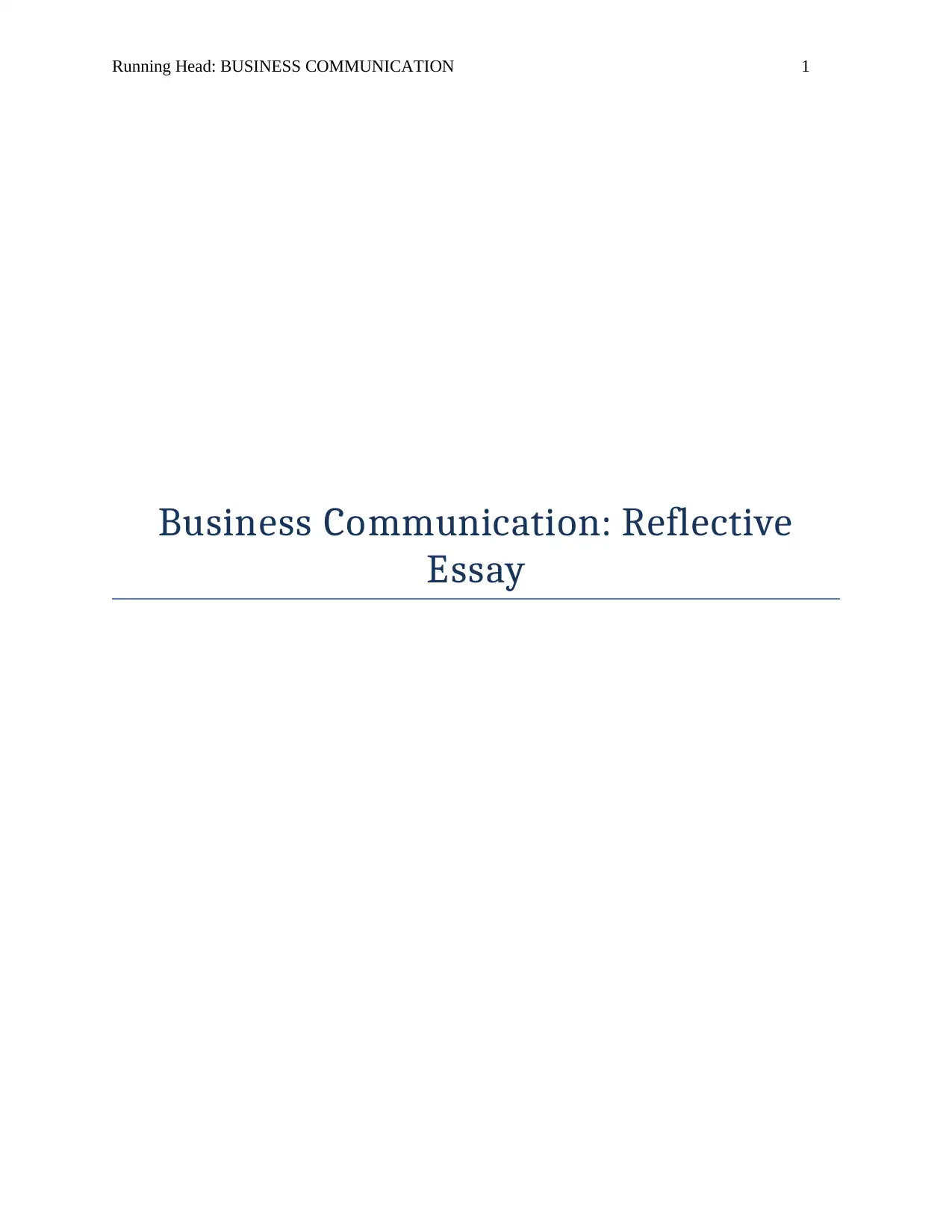
Running Head: BUSINESS COMMUNICATION 1
Business Communication: Reflective
Essay
Business Communication: Reflective
Essay
Paraphrase This Document
Need a fresh take? Get an instant paraphrase of this document with our AI Paraphraser
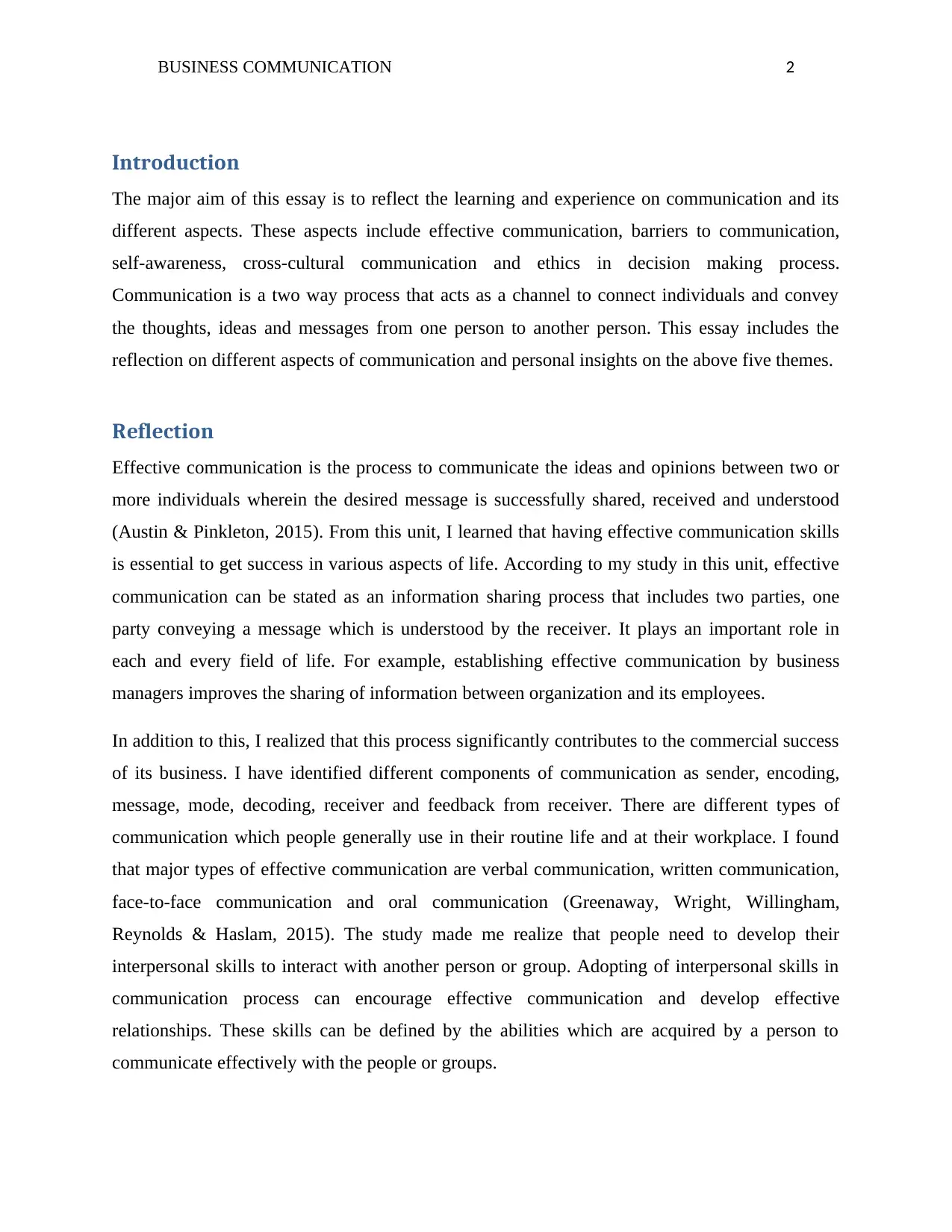
BUSINESS COMMUNICATION 2
Introduction
The major aim of this essay is to reflect the learning and experience on communication and its
different aspects. These aspects include effective communication, barriers to communication,
self-awareness, cross-cultural communication and ethics in decision making process.
Communication is a two way process that acts as a channel to connect individuals and convey
the thoughts, ideas and messages from one person to another person. This essay includes the
reflection on different aspects of communication and personal insights on the above five themes.
Reflection
Effective communication is the process to communicate the ideas and opinions between two or
more individuals wherein the desired message is successfully shared, received and understood
(Austin & Pinkleton, 2015). From this unit, I learned that having effective communication skills
is essential to get success in various aspects of life. According to my study in this unit, effective
communication can be stated as an information sharing process that includes two parties, one
party conveying a message which is understood by the receiver. It plays an important role in
each and every field of life. For example, establishing effective communication by business
managers improves the sharing of information between organization and its employees.
In addition to this, I realized that this process significantly contributes to the commercial success
of its business. I have identified different components of communication as sender, encoding,
message, mode, decoding, receiver and feedback from receiver. There are different types of
communication which people generally use in their routine life and at their workplace. I found
that major types of effective communication are verbal communication, written communication,
face-to-face communication and oral communication (Greenaway, Wright, Willingham,
Reynolds & Haslam, 2015). The study made me realize that people need to develop their
interpersonal skills to interact with another person or group. Adopting of interpersonal skills in
communication process can encourage effective communication and develop effective
relationships. These skills can be defined by the abilities which are acquired by a person to
communicate effectively with the people or groups.
Introduction
The major aim of this essay is to reflect the learning and experience on communication and its
different aspects. These aspects include effective communication, barriers to communication,
self-awareness, cross-cultural communication and ethics in decision making process.
Communication is a two way process that acts as a channel to connect individuals and convey
the thoughts, ideas and messages from one person to another person. This essay includes the
reflection on different aspects of communication and personal insights on the above five themes.
Reflection
Effective communication is the process to communicate the ideas and opinions between two or
more individuals wherein the desired message is successfully shared, received and understood
(Austin & Pinkleton, 2015). From this unit, I learned that having effective communication skills
is essential to get success in various aspects of life. According to my study in this unit, effective
communication can be stated as an information sharing process that includes two parties, one
party conveying a message which is understood by the receiver. It plays an important role in
each and every field of life. For example, establishing effective communication by business
managers improves the sharing of information between organization and its employees.
In addition to this, I realized that this process significantly contributes to the commercial success
of its business. I have identified different components of communication as sender, encoding,
message, mode, decoding, receiver and feedback from receiver. There are different types of
communication which people generally use in their routine life and at their workplace. I found
that major types of effective communication are verbal communication, written communication,
face-to-face communication and oral communication (Greenaway, Wright, Willingham,
Reynolds & Haslam, 2015). The study made me realize that people need to develop their
interpersonal skills to interact with another person or group. Adopting of interpersonal skills in
communication process can encourage effective communication and develop effective
relationships. These skills can be defined by the abilities which are acquired by a person to
communicate effectively with the people or groups.
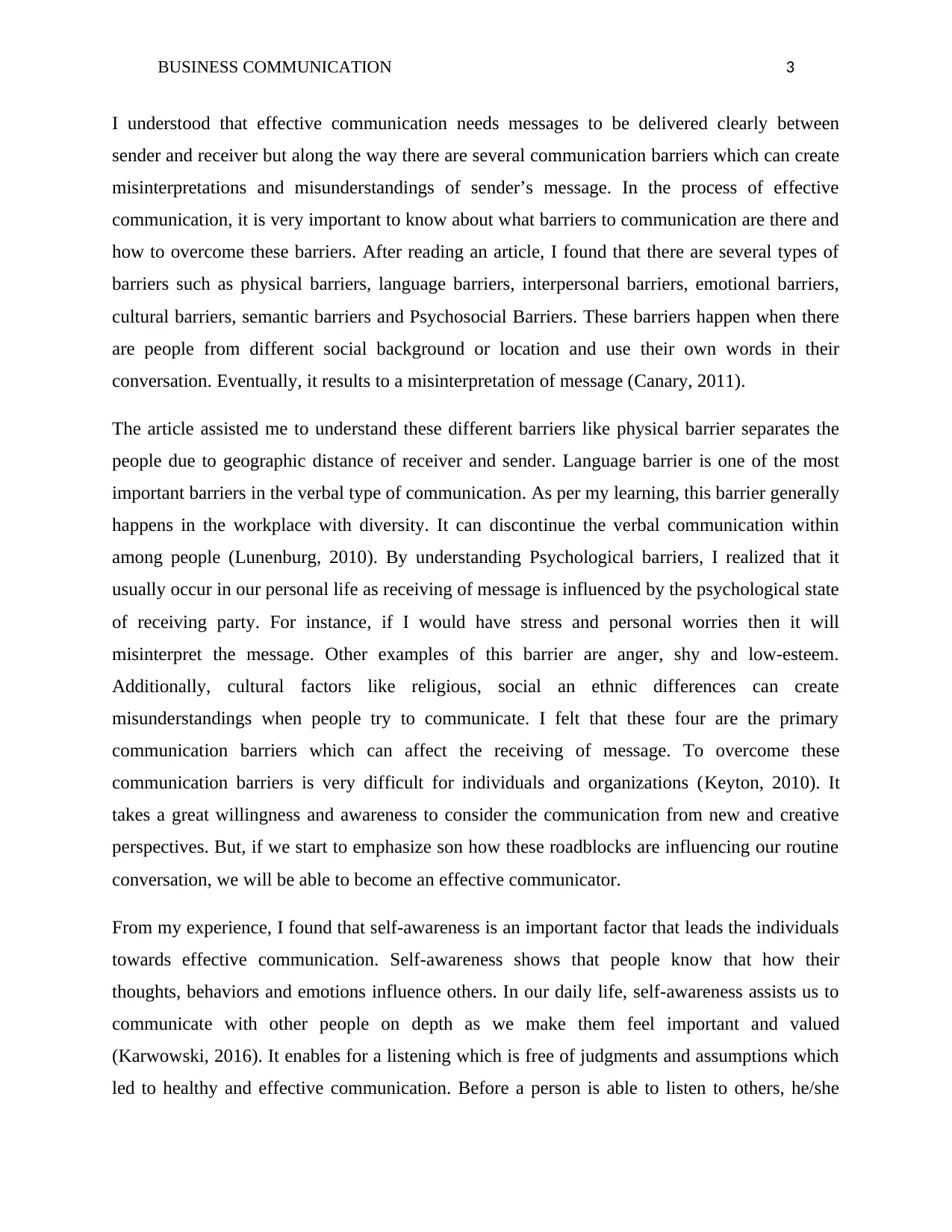
BUSINESS COMMUNICATION 3
I understood that effective communication needs messages to be delivered clearly between
sender and receiver but along the way there are several communication barriers which can create
misinterpretations and misunderstandings of sender’s message. In the process of effective
communication, it is very important to know about what barriers to communication are there and
how to overcome these barriers. After reading an article, I found that there are several types of
barriers such as physical barriers, language barriers, interpersonal barriers, emotional barriers,
cultural barriers, semantic barriers and Psychosocial Barriers. These barriers happen when there
are people from different social background or location and use their own words in their
conversation. Eventually, it results to a misinterpretation of message (Canary, 2011).
The article assisted me to understand these different barriers like physical barrier separates the
people due to geographic distance of receiver and sender. Language barrier is one of the most
important barriers in the verbal type of communication. As per my learning, this barrier generally
happens in the workplace with diversity. It can discontinue the verbal communication within
among people (Lunenburg, 2010). By understanding Psychological barriers, I realized that it
usually occur in our personal life as receiving of message is influenced by the psychological state
of receiving party. For instance, if I would have stress and personal worries then it will
misinterpret the message. Other examples of this barrier are anger, shy and low-esteem.
Additionally, cultural factors like religious, social an ethnic differences can create
misunderstandings when people try to communicate. I felt that these four are the primary
communication barriers which can affect the receiving of message. To overcome these
communication barriers is very difficult for individuals and organizations (Keyton, 2010). It
takes a great willingness and awareness to consider the communication from new and creative
perspectives. But, if we start to emphasize son how these roadblocks are influencing our routine
conversation, we will be able to become an effective communicator.
From my experience, I found that self-awareness is an important factor that leads the individuals
towards effective communication. Self-awareness shows that people know that how their
thoughts, behaviors and emotions influence others. In our daily life, self-awareness assists us to
communicate with other people on depth as we make them feel important and valued
(Karwowski, 2016). It enables for a listening which is free of judgments and assumptions which
led to healthy and effective communication. Before a person is able to listen to others, he/she
I understood that effective communication needs messages to be delivered clearly between
sender and receiver but along the way there are several communication barriers which can create
misinterpretations and misunderstandings of sender’s message. In the process of effective
communication, it is very important to know about what barriers to communication are there and
how to overcome these barriers. After reading an article, I found that there are several types of
barriers such as physical barriers, language barriers, interpersonal barriers, emotional barriers,
cultural barriers, semantic barriers and Psychosocial Barriers. These barriers happen when there
are people from different social background or location and use their own words in their
conversation. Eventually, it results to a misinterpretation of message (Canary, 2011).
The article assisted me to understand these different barriers like physical barrier separates the
people due to geographic distance of receiver and sender. Language barrier is one of the most
important barriers in the verbal type of communication. As per my learning, this barrier generally
happens in the workplace with diversity. It can discontinue the verbal communication within
among people (Lunenburg, 2010). By understanding Psychological barriers, I realized that it
usually occur in our personal life as receiving of message is influenced by the psychological state
of receiving party. For instance, if I would have stress and personal worries then it will
misinterpret the message. Other examples of this barrier are anger, shy and low-esteem.
Additionally, cultural factors like religious, social an ethnic differences can create
misunderstandings when people try to communicate. I felt that these four are the primary
communication barriers which can affect the receiving of message. To overcome these
communication barriers is very difficult for individuals and organizations (Keyton, 2010). It
takes a great willingness and awareness to consider the communication from new and creative
perspectives. But, if we start to emphasize son how these roadblocks are influencing our routine
conversation, we will be able to become an effective communicator.
From my experience, I found that self-awareness is an important factor that leads the individuals
towards effective communication. Self-awareness shows that people know that how their
thoughts, behaviors and emotions influence others. In our daily life, self-awareness assists us to
communicate with other people on depth as we make them feel important and valued
(Karwowski, 2016). It enables for a listening which is free of judgments and assumptions which
led to healthy and effective communication. Before a person is able to listen to others, he/she
⊘ This is a preview!⊘
Do you want full access?
Subscribe today to unlock all pages.

Trusted by 1+ million students worldwide
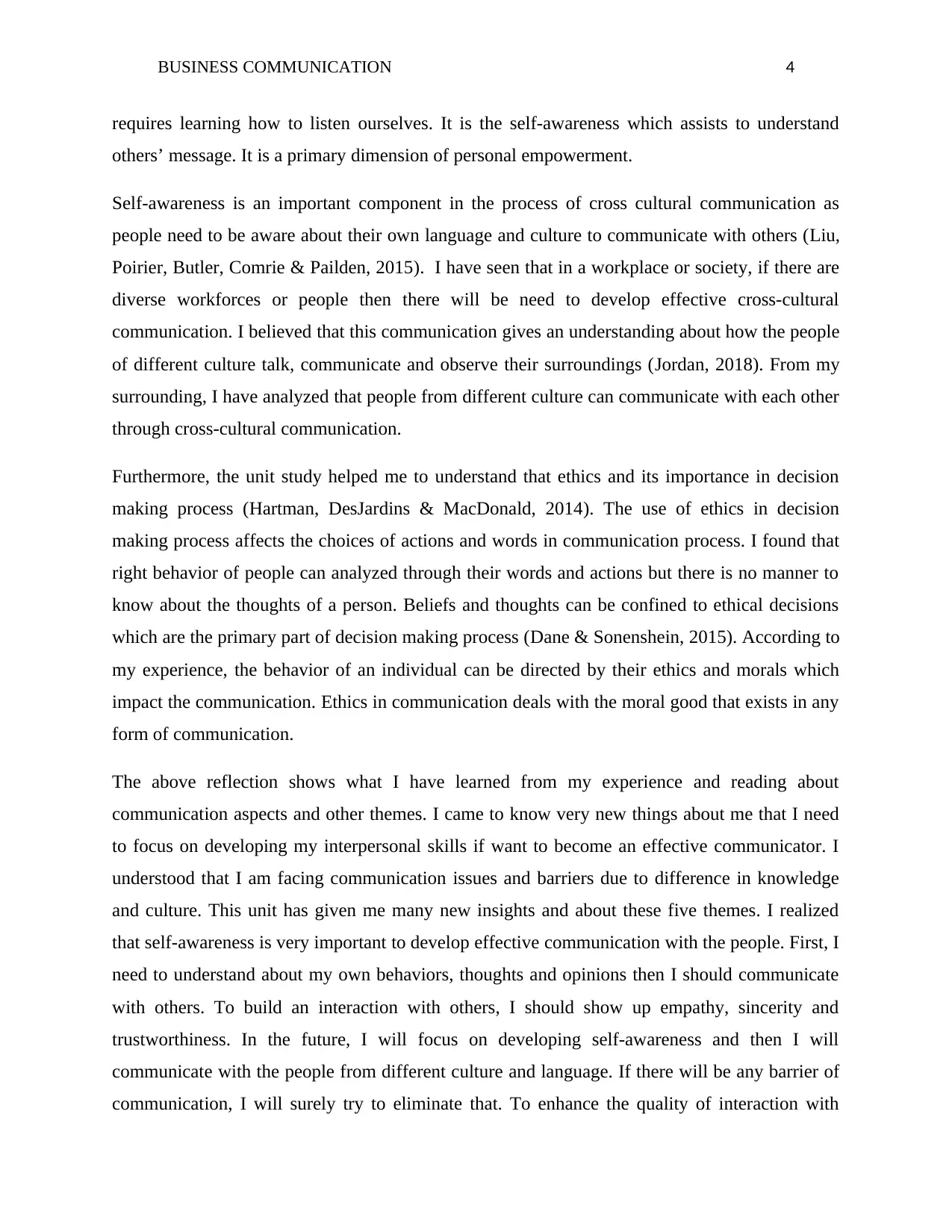
BUSINESS COMMUNICATION 4
requires learning how to listen ourselves. It is the self-awareness which assists to understand
others’ message. It is a primary dimension of personal empowerment.
Self-awareness is an important component in the process of cross cultural communication as
people need to be aware about their own language and culture to communicate with others (Liu,
Poirier, Butler, Comrie & Pailden, 2015). I have seen that in a workplace or society, if there are
diverse workforces or people then there will be need to develop effective cross-cultural
communication. I believed that this communication gives an understanding about how the people
of different culture talk, communicate and observe their surroundings (Jordan, 2018). From my
surrounding, I have analyzed that people from different culture can communicate with each other
through cross-cultural communication.
Furthermore, the unit study helped me to understand that ethics and its importance in decision
making process (Hartman, DesJardins & MacDonald, 2014). The use of ethics in decision
making process affects the choices of actions and words in communication process. I found that
right behavior of people can analyzed through their words and actions but there is no manner to
know about the thoughts of a person. Beliefs and thoughts can be confined to ethical decisions
which are the primary part of decision making process (Dane & Sonenshein, 2015). According to
my experience, the behavior of an individual can be directed by their ethics and morals which
impact the communication. Ethics in communication deals with the moral good that exists in any
form of communication.
The above reflection shows what I have learned from my experience and reading about
communication aspects and other themes. I came to know very new things about me that I need
to focus on developing my interpersonal skills if want to become an effective communicator. I
understood that I am facing communication issues and barriers due to difference in knowledge
and culture. This unit has given me many new insights and about these five themes. I realized
that self-awareness is very important to develop effective communication with the people. First, I
need to understand about my own behaviors, thoughts and opinions then I should communicate
with others. To build an interaction with others, I should show up empathy, sincerity and
trustworthiness. In the future, I will focus on developing self-awareness and then I will
communicate with the people from different culture and language. If there will be any barrier of
communication, I will surely try to eliminate that. To enhance the quality of interaction with
requires learning how to listen ourselves. It is the self-awareness which assists to understand
others’ message. It is a primary dimension of personal empowerment.
Self-awareness is an important component in the process of cross cultural communication as
people need to be aware about their own language and culture to communicate with others (Liu,
Poirier, Butler, Comrie & Pailden, 2015). I have seen that in a workplace or society, if there are
diverse workforces or people then there will be need to develop effective cross-cultural
communication. I believed that this communication gives an understanding about how the people
of different culture talk, communicate and observe their surroundings (Jordan, 2018). From my
surrounding, I have analyzed that people from different culture can communicate with each other
through cross-cultural communication.
Furthermore, the unit study helped me to understand that ethics and its importance in decision
making process (Hartman, DesJardins & MacDonald, 2014). The use of ethics in decision
making process affects the choices of actions and words in communication process. I found that
right behavior of people can analyzed through their words and actions but there is no manner to
know about the thoughts of a person. Beliefs and thoughts can be confined to ethical decisions
which are the primary part of decision making process (Dane & Sonenshein, 2015). According to
my experience, the behavior of an individual can be directed by their ethics and morals which
impact the communication. Ethics in communication deals with the moral good that exists in any
form of communication.
The above reflection shows what I have learned from my experience and reading about
communication aspects and other themes. I came to know very new things about me that I need
to focus on developing my interpersonal skills if want to become an effective communicator. I
understood that I am facing communication issues and barriers due to difference in knowledge
and culture. This unit has given me many new insights and about these five themes. I realized
that self-awareness is very important to develop effective communication with the people. First, I
need to understand about my own behaviors, thoughts and opinions then I should communicate
with others. To build an interaction with others, I should show up empathy, sincerity and
trustworthiness. In the future, I will focus on developing self-awareness and then I will
communicate with the people from different culture and language. If there will be any barrier of
communication, I will surely try to eliminate that. To enhance the quality of interaction with
Paraphrase This Document
Need a fresh take? Get an instant paraphrase of this document with our AI Paraphraser
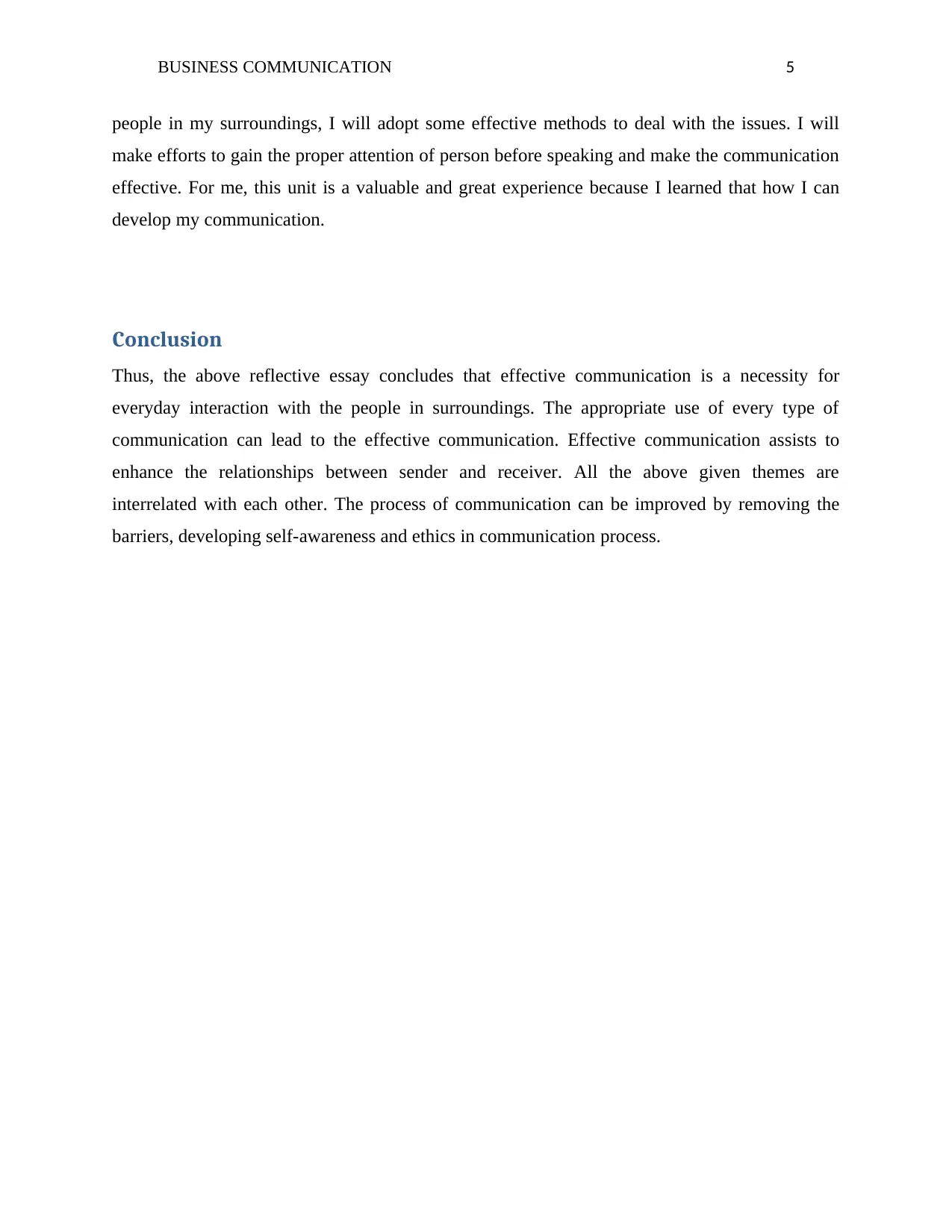
BUSINESS COMMUNICATION 5
people in my surroundings, I will adopt some effective methods to deal with the issues. I will
make efforts to gain the proper attention of person before speaking and make the communication
effective. For me, this unit is a valuable and great experience because I learned that how I can
develop my communication.
Conclusion
Thus, the above reflective essay concludes that effective communication is a necessity for
everyday interaction with the people in surroundings. The appropriate use of every type of
communication can lead to the effective communication. Effective communication assists to
enhance the relationships between sender and receiver. All the above given themes are
interrelated with each other. The process of communication can be improved by removing the
barriers, developing self-awareness and ethics in communication process.
people in my surroundings, I will adopt some effective methods to deal with the issues. I will
make efforts to gain the proper attention of person before speaking and make the communication
effective. For me, this unit is a valuable and great experience because I learned that how I can
develop my communication.
Conclusion
Thus, the above reflective essay concludes that effective communication is a necessity for
everyday interaction with the people in surroundings. The appropriate use of every type of
communication can lead to the effective communication. Effective communication assists to
enhance the relationships between sender and receiver. All the above given themes are
interrelated with each other. The process of communication can be improved by removing the
barriers, developing self-awareness and ethics in communication process.
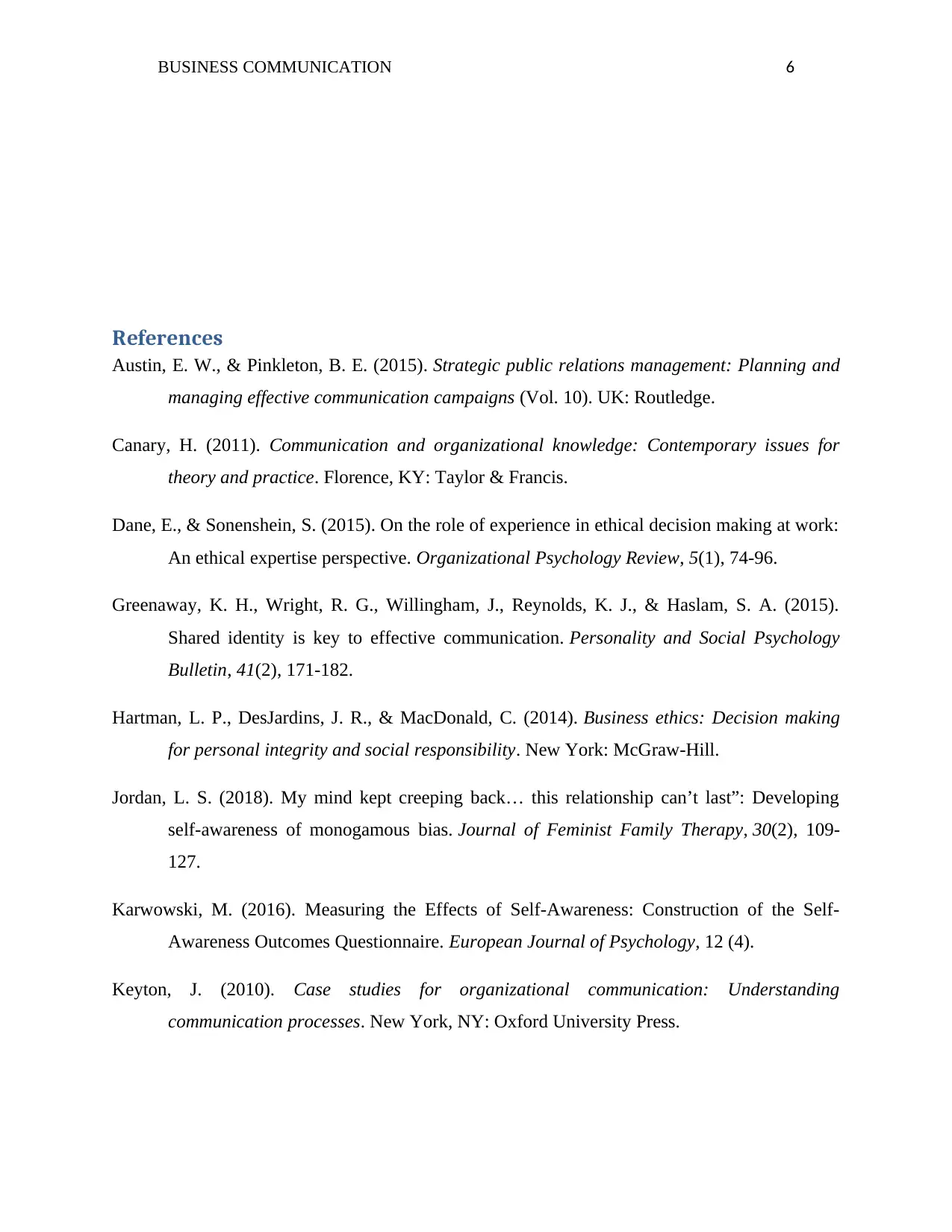
BUSINESS COMMUNICATION 6
References
Austin, E. W., & Pinkleton, B. E. (2015). Strategic public relations management: Planning and
managing effective communication campaigns (Vol. 10). UK: Routledge.
Canary, H. (2011). Communication and organizational knowledge: Contemporary issues for
theory and practice. Florence, KY: Taylor & Francis.
Dane, E., & Sonenshein, S. (2015). On the role of experience in ethical decision making at work:
An ethical expertise perspective. Organizational Psychology Review, 5(1), 74-96.
Greenaway, K. H., Wright, R. G., Willingham, J., Reynolds, K. J., & Haslam, S. A. (2015).
Shared identity is key to effective communication. Personality and Social Psychology
Bulletin, 41(2), 171-182.
Hartman, L. P., DesJardins, J. R., & MacDonald, C. (2014). Business ethics: Decision making
for personal integrity and social responsibility. New York: McGraw-Hill.
Jordan, L. S. (2018). My mind kept creeping back… this relationship can’t last”: Developing
self-awareness of monogamous bias. Journal of Feminist Family Therapy, 30(2), 109-
127.
Karwowski, M. (2016). Measuring the Effects of Self-Awareness: Construction of the Self-
Awareness Outcomes Questionnaire. European Journal of Psychology, 12 (4).
Keyton, J. (2010). Case studies for organizational communication: Understanding
communication processes. New York, NY: Oxford University Press.
References
Austin, E. W., & Pinkleton, B. E. (2015). Strategic public relations management: Planning and
managing effective communication campaigns (Vol. 10). UK: Routledge.
Canary, H. (2011). Communication and organizational knowledge: Contemporary issues for
theory and practice. Florence, KY: Taylor & Francis.
Dane, E., & Sonenshein, S. (2015). On the role of experience in ethical decision making at work:
An ethical expertise perspective. Organizational Psychology Review, 5(1), 74-96.
Greenaway, K. H., Wright, R. G., Willingham, J., Reynolds, K. J., & Haslam, S. A. (2015).
Shared identity is key to effective communication. Personality and Social Psychology
Bulletin, 41(2), 171-182.
Hartman, L. P., DesJardins, J. R., & MacDonald, C. (2014). Business ethics: Decision making
for personal integrity and social responsibility. New York: McGraw-Hill.
Jordan, L. S. (2018). My mind kept creeping back… this relationship can’t last”: Developing
self-awareness of monogamous bias. Journal of Feminist Family Therapy, 30(2), 109-
127.
Karwowski, M. (2016). Measuring the Effects of Self-Awareness: Construction of the Self-
Awareness Outcomes Questionnaire. European Journal of Psychology, 12 (4).
Keyton, J. (2010). Case studies for organizational communication: Understanding
communication processes. New York, NY: Oxford University Press.
⊘ This is a preview!⊘
Do you want full access?
Subscribe today to unlock all pages.

Trusted by 1+ million students worldwide
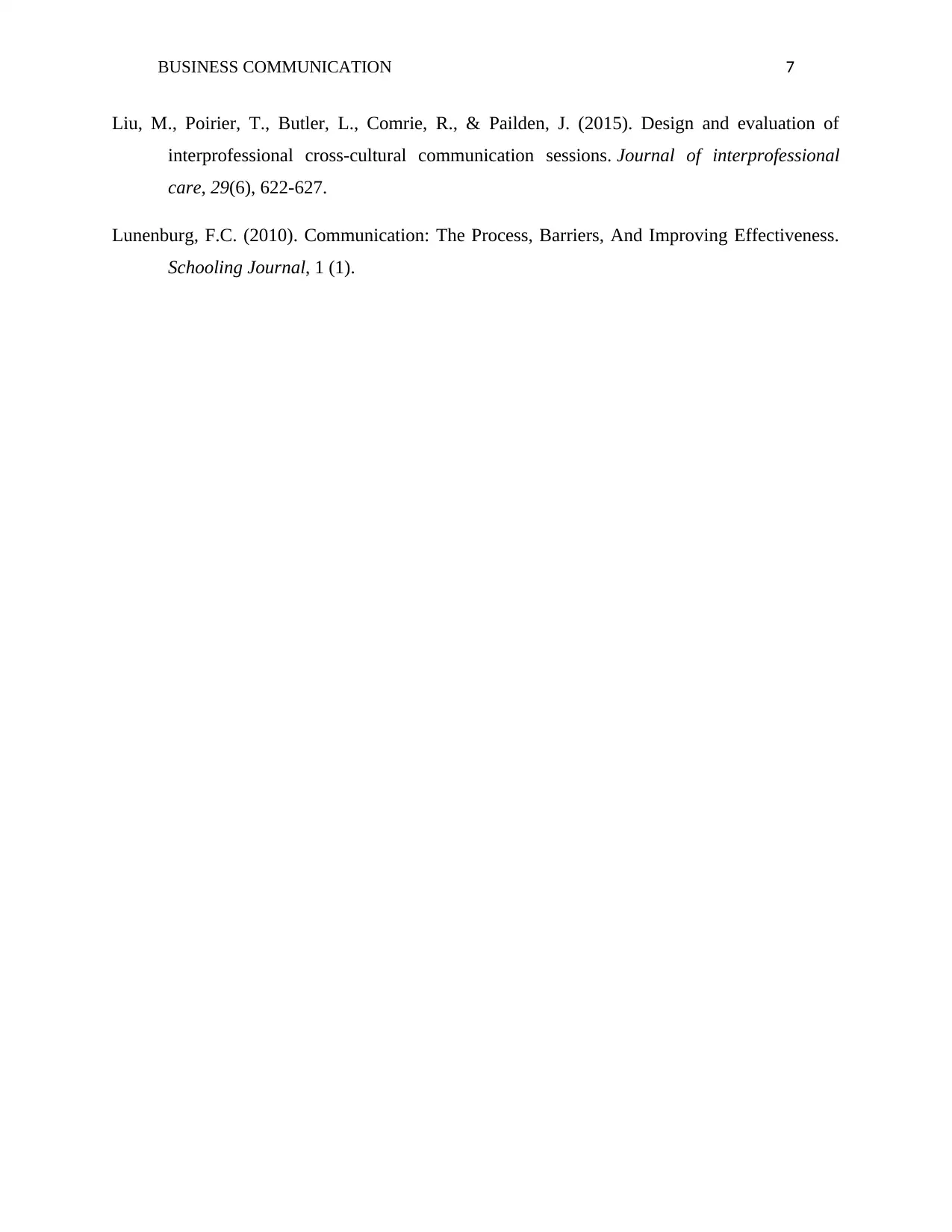
BUSINESS COMMUNICATION 7
Liu, M., Poirier, T., Butler, L., Comrie, R., & Pailden, J. (2015). Design and evaluation of
interprofessional cross-cultural communication sessions. Journal of interprofessional
care, 29(6), 622-627.
Lunenburg, F.C. (2010). Communication: The Process, Barriers, And Improving Effectiveness.
Schooling Journal, 1 (1).
Liu, M., Poirier, T., Butler, L., Comrie, R., & Pailden, J. (2015). Design and evaluation of
interprofessional cross-cultural communication sessions. Journal of interprofessional
care, 29(6), 622-627.
Lunenburg, F.C. (2010). Communication: The Process, Barriers, And Improving Effectiveness.
Schooling Journal, 1 (1).
1 out of 7
Related Documents
Your All-in-One AI-Powered Toolkit for Academic Success.
+13062052269
info@desklib.com
Available 24*7 on WhatsApp / Email
![[object Object]](/_next/static/media/star-bottom.7253800d.svg)
Unlock your academic potential
Copyright © 2020–2026 A2Z Services. All Rights Reserved. Developed and managed by ZUCOL.




